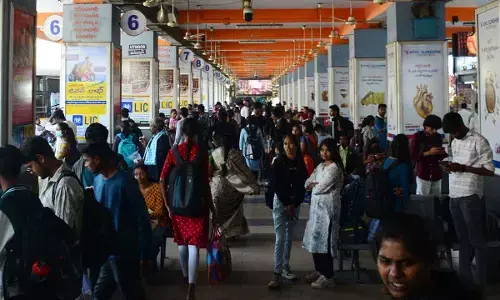Dalit as athlete and officer rolled into one

Raja Sekhar Vundru
 In 1987, a few rooms away from mine in the Jhelum Hostel at the New Delhi's Jawaharlal Nehru University lived a young muscular and a swift-walking gentleman who, I was told, was National Champion as the fastest athlete as a schoolboy. I was also told that his father, an IAS officer, had encouraged his children to be sportsmen and athletes, including Dammu Ravi, my hostel-mate.
In 1987, a few rooms away from mine in the Jhelum Hostel at the New Delhi's Jawaharlal Nehru University lived a young muscular and a swift-walking gentleman who, I was told, was National Champion as the fastest athlete as a schoolboy. I was also told that his father, an IAS officer, had encouraged his children to be sportsmen and athletes, including Dammu Ravi, my hostel-mate.
When I mentioned this to my maternal uncle, Vedala Bhimanna, then a Legal adviser to the Railway Board in Delhi, he vividly remembered the athlete's father as Dammu Ramakrishnaiah, a champion athlete of the Andhra University. My uncle's narration of Ramakrishnaiah's story was inspiring; a poor Dalit boy at the Andhra University drew crowds to watch his discus throw.
He told me that Ramakrishnaiah was into all forms of athletics (Decathlon) and was a University Champion. Like any other university gossip, he also told me that Ramakrishnaiah was in love with a young nurse and one day she came all the way to meet him at the University Hostel! The celebrity athlete's love story from my Uncle then finished with a happy marriage!
Autobiographies in English are not a regular stream of literature in India. An autobiography reflects the reality in time and space of the individual through his eyes. The writer has to be honest to his reflections, opinions and accurate of the happenings. When a Dalit writes about his life and times and when the saga is of a successful man climbing the walls of caste seeking justice and freedom, it is delightful reading. Rama- krishnaiah's autobiography falls in the category of a quick delightful read. Like in the fast lanes of his athletic speed, he takes us through the journey of his life.
A Dalit's own story invariably brings in the trials and tribulations of an existence in a caste system about which scores of autobiographies have emerged. The Ambedkarite movement and the emergence of Dalit literature in Marathi flowered into the greatest exposition of poetry, autobiography and stories in Marathi, only to be strongly followed in Telugu, Tamil, Hindi and Punjabi.
The famous Marathi autobiographies, more recently Urmila Pawar (The Weave of My Life: A Dalit Woman's Memoirs), Sharan Kumar Limbale (Outcaste) and Kishore Shantabai Kale (Against All Odds) have been translated. Omprakash Valmiki's Jhootan (Hindi) translation is now a part of national curriculum. Joseph Macwan's Gujarati translation, The Stepchild: Angaliyat, is another addition.
While a majority of the works reaching English readership were novels, such as Devanoor Mahadeva's Kannada novel Kusuma Bale and in Telugu G.Kalyan Rao's Antarani Vasantham and Vemula Yellaiah's Kakka. Telugu literature has to bring out many of them writing their autobiographies. Tamil writings in novel form from Sivakami and Bama have shaken the literary world. Susie Tharu and K. Satyanarayana's two-volume exhaustive 'Dossiers' on Dalit writings in Tamil and Malayalam ( No Alphabet in Sight ) and Telugu and Kannada ( Steel Nibs are Sprouting) are excellent reads.
One of the best autobiographies which recently emerged in English is from Andhra Pradesh: Y.B.Satyanarayana's My Father Baliah which "chronicles the relentless struggle of three generations of his family in this biography of his father. A narrative that derives its strength from the simplicity with which it is told is a story of great hardship and greater resilience."
The story further talks about when poised to inherit a huge tract of land gifted by the Nizam to his father, twenty-one-year-old Narsiah loses it to a feudal lord. This triggers his migration from Vangapally, his ancestral village in Telangana � the single most important event that would free his family and future generations from caste oppression. (My Father Baliah Y.B.Satyanarayana, 2011, Harper Collins).
Dammu Ramakrishnaiah's story, as it reads, is not the story of his own. He brings in the three generations of a Dalit family, immigrants from Rayalaseema to Masulipatam and to struggle his way through poverty to reach a respectable job in the Indian Administrative Service. He chronicles his immigrant father's family, his own and a vivid account of his children's families. Apart from the record of his various postings and his experiences he narrates, he traces the Gandhian Khadi movement of independence movement and its failure to financially sustain his father's generation.
The Congress party of pre-independence shifts 50 "Harijan" families (who were into weaving) from Rayalaseema to Masulipatam to get involved in the Khadi movement. Though he has not dwelt on the origin of the Vaishnavite sect of Dalits, it was through the Bhakti movement of the medieval period (his ancestors came from this sect), which admitted untouchables and probably took to weaving, like Dalit Kabir Panthi sect. But the national movement failed to sustain khadi, and the family of Ramakrishnaiah took to agriculture in assigned lands for Dalits.
In Masulipatam repeated cyclones and collapsed home; his loss of younger brother due to lack of medical attention, getting into chit funds to sustain family are the stories Ramakrishnaiah wanted to tell. In the IAS, a Dalit officer gets several opportunities to redeem himself, to ensure that the poverty, discrimination, injustice, trials and tribulations faced by him are not imposed in the area of his administrative jurisdiction. The chopped hands story of a tribal in Chittoor district is another memoir.
As a great athlete, Ramakrishnaiah contributed to the development of Andhra Pradesh sports and inspired his children to be both athletes and officers, and they became so. From a family of failed Gandhian khadi movement, Ramakrishnaiah eventually reaches Dr BR Ambedkar as the messiah of the downtrodden.
Ramakrishnaiah's autobiography falls in the category of a quick delightful read. Like in the fast lanes of his athletic speed, he takes us through the journey of his life
(The writer, an IAS officer and an Ambedkar scholar from the National Law School, Bangalore, is a Joint Secretary, Ministry of Agriculture, Government of India, New Delhi)











